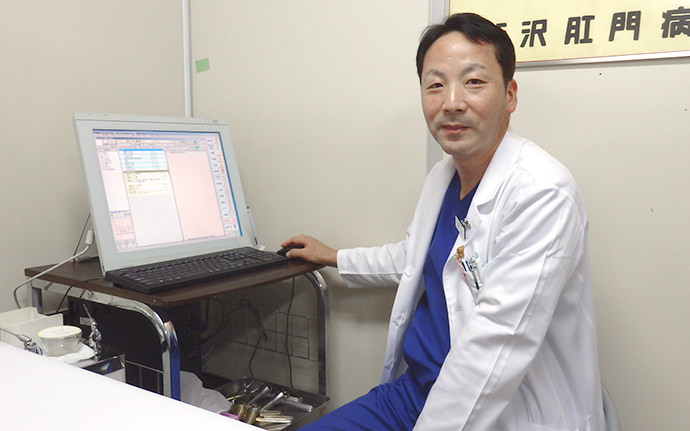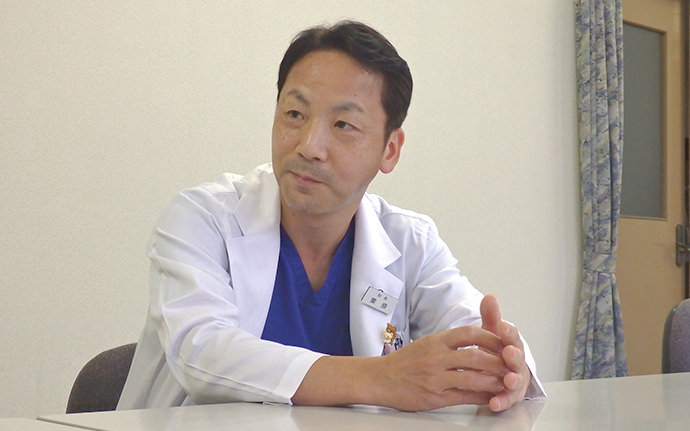
There are various types of “hemorrhoids,” but the most common type is “hemorrhoids” known as “piles.” Other types include "anal fissure" and "anal fistula." Symptoms differ according to the types. Symptoms of "hemorrhoids (piles)" include bright red anal bleeding and prolapsed hemorrhoids. Symptoms of “anal fissure” include minor bleeding and pain. Symptoms of "anal fistula" include a mass or itching, and pain or pyrexia if it becomes purulent. Some patients visit our hospital due to "anal pruritus" in which itching occurs around the anus, or "rectal prolapse" in which the rectum protrudes out the anus.
If anal bleeding cannot be stopped by OTC drugs for hemorrhoids, it is recommended to visit a hospital for identification of the cause of bleeding. Colorectal cancer may be the cause, so patients should not assume that bleeding is from hemorrhoids. "There is no delay in the treatment of hemorrhoids, but there is a delay in the treatment of colorectal cancer." if a patient does not visit a hospital in time. There are many patients with hemorrhoids who were found to have advanced colorectal cancer. This was investigated at our hospital and was published in a paper. Such patients tend to leave anal bleeding untreated assuming that the bleeding is from hemorrhoids. So it is also important for patients to receive an endoscopy after reaching the age of 40 years. Patients receiving routine medical examinations will not have to be afraid of bleeding.
Anal fistula may also be a cause of cancer, but simple anal fistula rarely leads to cancer. However, since complex anal fistula may develop into cancer, early treatment with surgery is recommended.
People who often cannot go to the toilet when they want, for example, drivers, are likely to be constipated, which would place pressure on the anal region. Although everyone strains to defecate for a short time, straining for a long time is not recommended. Some patients say that they spend 30 minutes on the toilet, but it is not good to continue straining because the anus may become congested. It is important to go to the toilet when you have defecation desire and to pass stools quickly, not to remain seated on the toilet for a long time before defecation. It is also important not to remain in the same posture wherever one is sitting, not only on the toilet.
Other than these, lifestyle habits are also important. It is not recommended to be governed by habits; however,if you routinely have a bowel movement at the same time each day, it will be less likely to be constipated and the burden on the anus will be reduced.
It is important to eat breakfast and drink a glass of water every morning, which is a tip for moving the bowels by the use of a mechanism called the gastrocolic reflex.
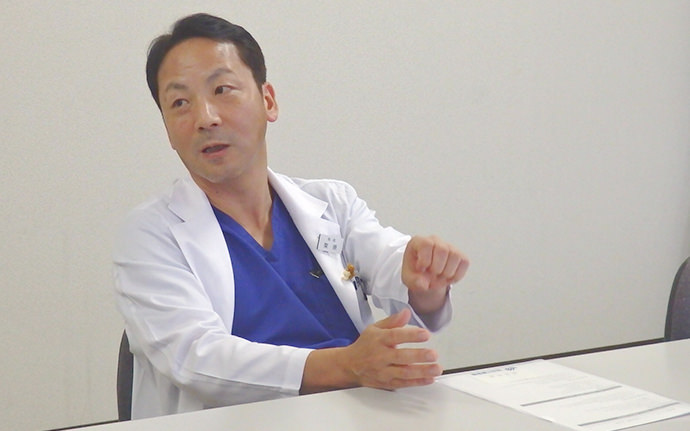
"Hemorrhoids (piles)" are caused by bowel circumstances, such as constipation. Due to constant straining, the supporting tissue in the anal canal becomes loose and so-called cushions (anal cushions), masses of vascular and connective tissue structures, become larger and protruded. "Anal fissure" is a tear often caused by hard stools due to constipation, but it may also occur in persons with diarrhea. "Anal fistula" is likely to occur in persons with a physical constitution prone to diarrhea. This is because the diarrheal stools enter a small cavity at the border between the anus and rectum, causing suppuration. In any case, pressure on the anal region is the main cause.
Other than this, bowel diseases may cause anal disorders. Intestinal inflammation, such as Crohn's disease, may cause anal fissure or anal fistula.
The physical constitution of the patient seems to be related to a susceptibility to hemorrhoids. Children whose parents have a history of hemorrhoids develop hemorrhoids, cases of which are relatively common. Children and parents may have similar shaped buttocks as with other features. In addition to having similar constitutions, eating and bowel habits may be similar.
A tear in the lining of the anus (anal fissure) commonly occurs in children with constipation when they pass hard stools. Infants or children with anal fissure do not want to pass stools due to pain, which leads to fecal loading or impaction in the intestine and makes stools even harder. This will result in a vicious cycle of constipation. In such a case, abdominal pain may occur in addition to anal pain. Caution must be exercised.
Hemorrhoids and various other perianal problems may occur in the elderly. "Rectal prolapse" is one of such conditions in which the rectum protrudes from the anus. This disease is thought to be caused by loosening of the anal sphincter and such. In some cases, about 5 cm to 30 cm (in severe cases) of the rectum is prolapsed. Although it does not hurt, some patients with rectal prolapse visit our hospital because they notice something sticking out of the anus or their undergarments get soiled with blood or mucus, and some patients complain that the prolapsed rectum interferes with their walking. In addition, elderly patients with rectal prolapse may not be admitted to some facilities for the aged, so they said that they wanted to have rectal prolapse cured to be admitted to such facilities.
It is recommended that patients consult a proctologist who belongs to the Japan Society of Coloproctology, the Japanese Association for Clinical Proctology, or other related associations. Although there are various hospitals (including university hospitals) and clinics where the “department of proctology” is included at the end of the list of departments, physicians at some proctology departments of such hospitals and clinics may keep prescribing drugs for patients, and not offer other treatment options. If cancer is not detected early, it may be too late for treatment. If bleeding continues, intestinal examination should be performed. If pain persists, conservative therapy may be ineffective. Therefore, it is recommended for patients to choose a hospital or clinic where a proctologist offers various treatment options including surgery. Hospitals or clinics, where proctologists suggest appropriate treatment courses, giving patients a satisfactory explanation, are recommended. There is an option to switch hospitals or clinics if no alleviation of symptoms is achieved by long-term drug therapy. It is also recommended to choose a hospital or clinic which has a record of many cases of anal surgery.
At the initial visit, patients are asked to fill out a questionnaire on their medical history and a proctologist performs history taking and physical examinations while checking it. After that, patients are asked to lie on their side for a thorough examination of the anus. Proctologists must examine not only the inside of the anus but also the perianal region. After that, a digital examination will be performed to check the lining of the anus. For the digital examination, proctologists insert a finger, touching the inside of the anus. After the digital examination, anoscopy is performed for confirmation. Only experienced proctologists can perform an anal examination. Therefore, hospitals where fully experienced proctologists are available are recommended.
At our hospital, the expenses for the initial visit will be about 2,000 yen, and about 5 minutes will be required for medical examinations. However, for patients presenting with bleeding, endoscopy may be performed on the day of the initial visit. In such cases, the time and expenses will differ. In the case of inpatient surgery, the hospitalization period will be about one week and the cost will be 70,000 to 100,000 yen.
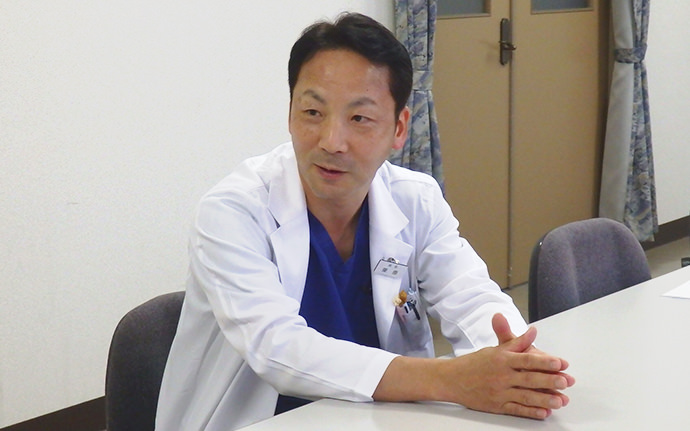
Patients who have first experienced anal bleeding or who have had sudden onset of external thrombosed hemorrhoids visit a hospital relatively soon. However, there are patients who experience prolapsed hemorrhoids repeatedly at every bowel movement and manually put them back in place. Such patients do not visit a hospital for years, during which time their condition gradually gets worse. At first, patients may experience mild prolapse in which only a part of hemorrhoids prolapses and reduces spontaneously; however, prolapsed hemorrhoids may progress and occur while patients have bowel movements or are doing sports, and even while they are walking. Prolapsed hemorrhoids cannot be treated by drugs, so it is recommended that patients visit a hospital early rather than continuing to reduce them manually. For small hemorrhoids, rubber band ligation therapy or injection sclerotherapy will be performed in outpatient settings. Radical surgery is hemorrhoidectomy, and if the affected area is completely excised, hemorrhoids (piles) are unlikely to recur.
Anal fissure is a tear in the lining about 1 cm from the anus. In cases of painful defecation or acute anal fissure that hurts when hard stools are passed, a hemorrhoidal ointment or stool softener is prescribed.
Chronic anal fissure may cause inflammation of the muscle, leading to anal stenosis (narrowing of the anus). For patients with such condition, surgery is performed. Anal fissure pain is not a pain when a tear occurs. Anal fissure pain is a dull pain when very hard stools are passed through the anus. Surgery is often performed on patients who are experiencing persistent dull pain for hours after defecation. Other than the above, there is another type of anal disorder, "associated anal fissure," which is a condition in which anal fissure is caused by hemorrhoids (piles) repeatedly passing through the anus, protruding and retracting. In such a case, hemorrhoidectomy must be performed because anal fissure cannot be cured unless hemorrhoids (piles) are excised.
Anal fistula is not usually purulent but often becomes purulent when patients with anal fistula have diarrhea or such. Anal fistula requires surgery. Anal fistula is a condition in which a core-like tube called a "fistula" to drain pus to the perianal skin is formed, so anal fistula surgery is performed to remove a fistula. It was said previously that anal fistula occurs in 100% of patients with "anal abscess," which might be the cause of anal fistula. However, recently, it has been said that, in about 20% to 30% of patients, anal abscess is resolved without causing anal fistula. At our hospital, early treatment with surgery is recommended for anal fistula that is detected as a well-defined mass. For most patients presenting with anal fistula, surgery is recommend at the first visit to our hospital. Even if surgery is not scheduled at the first visit, patients must undergo surgery when they revisit our hospital for recurrence of anal fistula. The reason is that anal fistula may repeatedly recur, during which time pus may drain from a different site, resulting in the formation of complicated fistulae. Excision of extensive areas is required for complicated fistulae.
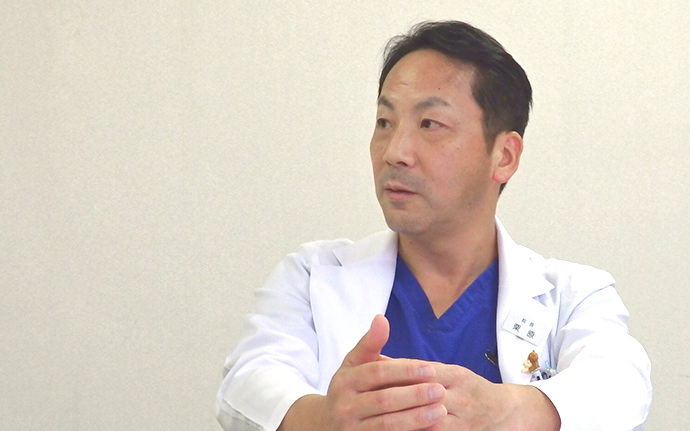
After surgery, bowel movements are painful, and constipation may occur in some patients while they are unwilling to pass stools. Patients are instructed to tolerate some pain and to defecate before they are constipated. The use of moderate laxatives is acceptable. However, it is not good for patients to keep passing diarrheal stools, which may cause the anus to become inflexible, resulting in various problems. It is favorable that the anus is dilated to a certain extent by feces and the perianal skin is healed with anal dilatation. However, if the wound is healed without anal dilatation, the anus may become narrow or a duct may form like an anal fistula. Patients should not keep passing watery stools using laxatives to avoid painful defecation. It is important to pass solid stools to dilate the anus. Proctologists perform postoperative examinations, checking if the anus has become inflexible, and if this is observed, manual anal dilatation will be performed. During a certain postoperative period, patients experience painful defecation, dull pain similar to that caused by anal fissure. Despite such pain, patients should pass stools to allow the anus to be dilated.
There are various cases of constipation, and therefore symptoms must be closely checked to establish a correct diagnosis. Some patients with hemorrhoids complain of constipation, assuming that hemorrhoids are residual stools. Such patients no longer complain of constipation after hemorrhoids have been excised. Most importantly, physicians should pay attention to the possibility of colorectal cancer by which defecation is obstructed, leading to constipation. Colon and rectal examinations must be given to patients with persistent constipation.
There is no problem with 2 to 3 bowel movements a day. It is important for patients to "feel stools pass through the anus" at defecation. For patients who are constipated, it is not recommended to control bowel movements by taking irritant laxatives to induce diarrheal stools. Even if patients think that they have emptied their bowels by passing diarrheal stools induced by such laxatives, residual stools remain in the bowels, causing a sensation of inadequate defecation. It is often said that banana-like stools are good, and it is important to pass solid stools smoothly. Recently, new types of laxatives have been developed, so it is recommended that patients consult their primary care physicians.
